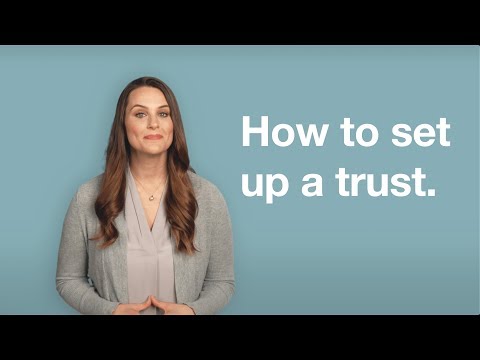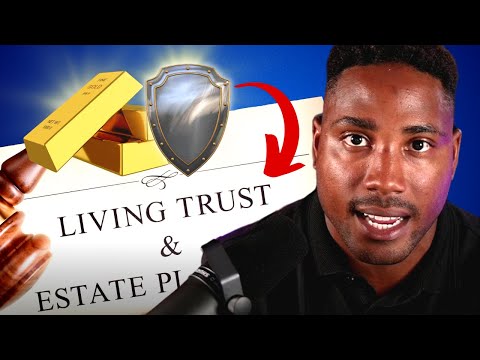Deciphering the world of trusts can often seem like trying to solve an overcomplicated jigsaw puzzle. Fortunately, you’ve landed just at the right spot. Today, we shine the proverbial flashlight on ‘how to set up a trust,’ unlock the first crucial steps, and guide you effectively through the process. Buckle up, for this is going to be an exciting and highly educational journey.
Decoding How to Set Up a Trust: Unlocking the First Steps
So folks, let’s start at square one. Hopefully, by now, you already know that a trust can be a fabulous tool for preserving your wealth and passing it on efficiently. But, where do you even begin, and how to set up a trust?
Let’s differentiate the primary types of trusts first. We generally categorize trusts into four main types: living trusts, testamentary trusts, revocable trusts, and irrevocable trusts. Each type has its pros and cons, and understanding these is vital for making an educated decision.
Now, don’t just jump onto the trust bandwagon because everyone else is doing it. Understand your personalized situations and assess whether you need a trust or not. Notably, if you own real estate or if you have some $100,000 or more, setting up a trust might be a smart decision.

Unraveling the Myriad Benefits of a Trust
Now, as promised, let’s dive headfirst into the nitty-gritty of the benefits of a trust. Trusts are essentially a legal device that lets you put conditions on how and when your assets will be distributed upon your death. But the benefits go a bit deeper than that surface-level explanation.
Tax savings are a significant perk and probably the most attractive aspect of trusts. They are crafted in a way that allows you, as a trustor, to leave significantly more wealth to your heirs. Sounds exciting, right? We are not stopping there!
Establishing a trust grants you control over your assets, not just during your lifetime but also beyond the grave. Yep, that’s right! You can essentially rule your financial kingdom from the afterlife, directing how your wealth gets distributed and used.
Moreover, trusts provide a protective shield against potential threats like lawsuits or creditors. If you’ve got a financial moat around your assets, it’s going to take more than a rainy day to wash them away.
Another major perk of a trust is the privacy and probate avoidance it offers. By initiating a trust, you ensure that your family avoids the costly and time-consuming process of probate entirely. Also, a trust guarantees that your financial matters remain a private family affair, away from prying eyes.

| Aspect | Description |
|---|---|
| Types of Trusts | 1. Living Trusts. 2. Testamentary Trusts. 3. Revocable Trusts. 4. Irrevocable Trusts. |
| Complexity | Trusts require legal expertise to draft |
| Cost | They require ongoing management by a trustee, administrative fees, and possibly tax filings |
| Minimum Required Investment | There isn’t a clear cut rule on this,but it might be beneficial if you have $100,000 or more and own real estate |
| Purpose of a Trust | To determine how a person’s money should be managed and distributed, either alive or after death. It can help an estate avoid taxes and probate, protect assets from creditors and dictate the terms of inheritance for beneficiaries |
| Date | July 18, 2023 |
The Checkpoints: Things to Consider Before You Start a Trust
Alright, enough with the benefits, let’s circle back to how to start a trust. Now, remember, dipping your toes into the trust pool isn’t once-and-done. It takes analysis and consideration of your financial needs and goals, among other factors.
First things first, ask yourself, ‘Do you’ve proper wealth to justify setting up a trust?’ Remember, trusts can be complex and expensive to set up and manage. You most certainly don’t want to be going into this without understanding the costs involved. Additionally, it sneakily involves regular tax filings, which could add more to the overall cost.
The second checkpoint is identifying the correct beneficiaries. This step is the backbone of your trust, as these are the people you wish to leave your wealth to.
Last but not least, the decision of selecting a trustee is paramount to the functioning of the trust. A trustee can be a person or institution, like Kerry Condon, who ensures your wishes are carried out after your departure from this world.
Navigating the Legal Terrain: How to Open a Trust
Let’s delve deeper on ‘how to open the trust.’ First and foremost, be sure to seek professional advice and support when deciding to set up a trust. Navigating the legal labyrinth without professional guidance could get messy and potentially detrimental.
Next on our list is drafting the trust document. Think of this as the rule book that details how your trust should operate. Remember to ensure that the document is clear, comprehensive, and mirrors your exact wishes.
Finally, don’t skimp on the assignment of your trustee. This guy or gal is going to be your financial proxy, so entrust someone who’s inherently trustworthy, knowledgeable, and consistent.

Walking Through the Trust Setup: The Practical Aspects
Now that we’re familiar with the nuts and bolts of setting up a trust, let’s walk through the practical aspects. Your trust journey doesn’t end with creating a trust document and appointing a trustee. A few more steps need to be taken on this road.
First, it’s time to assign your assets to the trust. This process involves re-titling your assets into the name of the trust. Got a sweet beach house in the Bahamas? Well, it’s not yours anymore. It’s the trust’s.
Next up is updating beneficiary designations to match the trust’s objectives. Ensure you’ve listed your current spouse, children, and anyone else who should benefit from your assets after your demise.
Lastly, you need to fund the trust. How do you do that? Simply, by transferring your assets into the trust. This step ensures that your trust has the necessary assets to complete its objectives.

Understanding the Ongoing Process: How to Maintain and Manage a Trust
You know what they say – trust is a living entity, and just like every living being, needs a little maintenance and management. This is not a “set-it-and-forget-it” deal.
Your trust documents are not concrete. While they may seem steady as a rock, they need an annual review. Life changes, situations arise, and as such, your trust should adapt accordingly.
Another aspect to bear mind is updating or amending your trust as needed. Bought a nifty new yacht? Just won the lottery? Perhaps, you’ve inherited some wealth. All these situations should drive amendments to your trust.
Last but certainly not least, you’ve got to keep tabs on the tax filing and distribution requirements. No one likes a surprise letter from the taxman, right? Keeping up with required filings and distributions can help you stay on top of your trust obligations.

Trust You: Empowering Yourself in Trust Formation Services
Now, we’ve covered a lot so far. While some of it may seem daunting, it’s essential to empower yourself through education and understanding about setting up a trust. Informed decisions are always the best decisions.
Selecting affordable and trustworthy services is crucial here. Remember, high prices don’t always equate to high-quality services. Look for trustworthy service providers who have experience in trust formation.
Continuous monitoring and revisions of your trust are a must. This assurance ensures that your trust operates in accordance with your objectives and remains in compliance with the latest regulations.
Navigating the Trust Landscape: Useful Tips and Cautionary Tales
Now that we’re approaching the end of our journey on ‘how to set up a trust,’ let’s wrap up with some useful tips and cautionary tales from the trust landscape.
One of the common pitfalls to avoid is neglecting your trust after its formation. Trusts require regular maintenance and updates to reflect changing life events and scenarios. So, please avoid the set-and-forget mentality here.
When it comes to managing disputes or controversies, it’s best to outline these protocols in your trust documents. Not only does this prevent future conflicts, but it also keeps everyone in the loop about the process.
And remember, your trust journey doesn’t end when you say, ‘I do.’ The investment remains dynamic, much like your own life. Stay abreast of changes and keep your documents up to date.
Tying the Trust Knot: Final Thoughts on Setting Up a Trust
Establishing a trust is more than just a financial journey; it’s about securing financial stability for your loved ones, long after you’re gone. We hope this guide simplifies the process and provided you with valuable insights on ‘how to set up a trust.’
In closing, remember the important steps we walked through here today; understanding your specific need for a trust, the benefits, your financial goals, and the overall setup process.
As Robert Kiyosaki wisely said, “It’s not about how much money you make, but how much money you keep, how hard it works for you, and how many generations you keep it for.” A trust can ensure this statement rings true.
Stay vigilant, stay informed, and happy trust-forming!
What are the three types of trust?
Well, brushing up on trust fundamentals, eh? There are primarily three types of trusts: revocable, irrevocable and testamentary. Revocable trusts are adjustable, as the name suggests, while the irrevocable ones are like boulders—steady and unchangeable. Lastly, testamentary trusts are formed after a person’s death. They’re a legal home for assets left behind!
What are the disadvantages of a trust?
However, like all things, trusts aren’t magic wands. Some disadvantages they carry: they’re pricey to create, could claim ongoing expenses, and might limit your access to assets. Also, sometimes their tax sheltering prowess isn’t all it’s cracked up to be. Long story short, they can be a bit of a pain in the purse!
How much money do you need to have trust?
On the topic of costs, setting up a trust isn’t a penny-pinching affair. You can’t borrow a cup of sugar from your neighbor for this! Expecting to front up around $1,000 to $2,500 is pretty standard for a basic trust. It’s not cheap as chips, but it gets the job done.
What is the main purpose of a trust?
Trusts aren’t merely password-protected piggy banks. Their main purpose is asset management and protection, smooth wealth transfer, and tax minimization. In essence, they’re like having a financial nanny for your hard-earned nest egg.
What assets should not be in a trust?
Now listen, not everything should find its way into a trust. Certain assets, like IRAs and 401(k)s already carry built-in tax advantages and aren’t a good fit. And guess what? Your motor vehicles don’t fancy being tied up in trusts either.
What is the best kind of trust to have?
As for the best kind of trust, truth be told, there’s no one-size-fits-all. It really boils down to your unique circumstances and needs. It’s a classic case of different strokes for different folks.
Do you avoid taxes with a trust?
Now doing the tax tango with a trust may sound tempting but it’s not clear cut. While trusts can help minimize estate taxes, they hardly avoid taxes altogether. They often have different, sometimes higher, income tax rates. So don’t count your chickens before they’ve hatched!
Why do rich people put their homes in a trust?
Ah, the million-dollar question, why do the Richie Riches put their homes in a trust? Well, simply put, trusts provide privacy, avoid probate and allow for smooth handover to heirs. They’re the key to the mansion, without all the red tape!
Should my parents put their property in a trust?
Concerning the family homestead, your folks need to decide if trust is right for them. Sure, it offers asset protection and avoids probate, but it can also be costly and cumbersome. It’s not all peaches and cream, so some serious chin-wagging is needed.
Why trust is better than a will?
You might wonder why we’re team trust over a will. Truth is, trusts have a leg up. They allow for asset management during incapacity, bypass the whole wrecking ball of probate and often ensure more efficient wealth transfer.
How much money is in the average trust?
As to the average account balance in trusts, it greatly varies. However, a general ballpark figure waves around the $3.5 million mark. Now that’s nothing to sneeze at!
What is the 5 or 5000 rule in trust?
Ever heard of the 5 or 5000 rule? It states that trust beneficiaries have the right to demand an accounting if either 5 years have passed, or there are $5000 investable assets. A bit of a watch-dog role, you see?
What are the disadvantages of putting your house in a trust?
While placing houses in trusts has merit, like minimising probate, it does have downsides too: it may complicate future plans to sell or remortgage the property. Also, mortgage lenders may shy away. So it’s a bit of a mixed bag.
What are 3 advantages of a trust over a will?
There are certainly perks to a trust over a will. Three biggies are: faster distribution of assets, more control over how assets are used, and less chance of legal disputes. In other words, they make administration (and life) a whole lot easier!
Can creditors go after a trust?
Now, on to the sticky fingers of creditors. While a trust isn’t a 100% iron-clad shield, it certainly provides better protection than simply owning assets outright. Still, it’s not a bulletproof vest.
What is the most common form of trust?
The most common trust is the revocable living trust. It’s like the Swiss army knife of trusts – a jack of all trades that, if used wisely, can supersede a will, manage your estate, and prevent conservatorship.
What is the best trust for elderly?
For the elderly, a revocable living trust can be a winning play. It allows seniors to retain control of their assets but bypass all the unpleasantness of probate. A pretty nifty safety net!
What is the difference between a living trust and a revocable trust?
The difference between a living trust and a revocable trust? Trick question! They’re largely the same – think of them as twin brothers. They serve similar purposes in estate planning, and are changeable during the grantor’s lifetime.
What are the 4 principles of trust?
There are four key principles of trust: competence (showcasing your ability), integrity (keeping your promises), care (addressing others’ needs), and transparency (telling it like it is). Without these, buddy, you’re not playing the trust game right!



